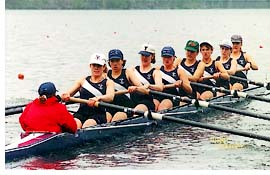|
|



|
Thirty
Years Later: Title IX Still Controversial
By Matt Sedensky
Produced for the Web by Debra Hirschfield
As
a high school gymnast in the drab, dreary days of women's
sports in the early '70s, Chris Ernst had to arm wrestle
boys for time to practice in the school gym.

Yale University
Crew Team |
And
three years later, as a rower at Yale,
Ernst sat, dripping with sweat and shivering in the cold,
as her crew team waited for showers and locker rooms to become
available to them. When Ernst grew too tired of such blatant
inequities, she rallied her teammates in a dramatic protest.
Nineteen women rowers marched into Yaleís athletic office,
read a statement, and stripped to the waist, exposing the
words "Title IX" emblazoned in blue ink on each womanís back
and breasts. The landmark legislation, which deemed the bias
Ernst faced illegal, had been passed three years earlier.
Nearly 30 years and two Olympic appearances later, Ernst admits
Title IX is a bit more effective. She says the huge gains
women have made in sports are abundantly clear. But also clear
is the growing opposition to unintended interpretation of
the legislation, leading to cut teams and crushed dreams for
some men.
| "My
mom never went to one of my games because she was ashamed." |
Joan
Martin, senior associate director of athletics at Monmouth
University in New Jersey, says pre-Title IX women like herself
know full well what the legislation has done.
"I was talented, but my talent was not appreciated or approved
of by most," she reminisced. "It didnít matter that in neighborhood
pick-up games I was selected before my brothers. Society dictated
that I should watch, and that they should compete."
Deprived of her own participation in athletics, Martin joined
Monmouth as a womenís basketball coach in 1969. "When I
first came here," she said, "we had a couple of different
womenís teams, but they all used the same uniforms." Martin
said female athletes all shared a common locker room and their
use of facilities was scheduled around any male usage, even
intramural sports.
"Some of the best athletes that we ever had come here came
during that period, but no one would ever have known it,"
Martin said.
"When I took part in athletics it was not considered a normal
thing. You were a tomboy; there was something wrong with you,"
she said. "My mom never went to one of my games because she
was ashamed. But now, itís an accepted thing."
Washington State Senator Jeanne Kohl-Welles has been active
in many aspects of Title IX since the year after its passage.
"We havenít after all these years reached full compliance,"
she admits. "But on the whole thereís been a lot of progress
made."
NEXT:
A VICTORY FOR WOMEN'S SPORTS
|
|
|
|
|

